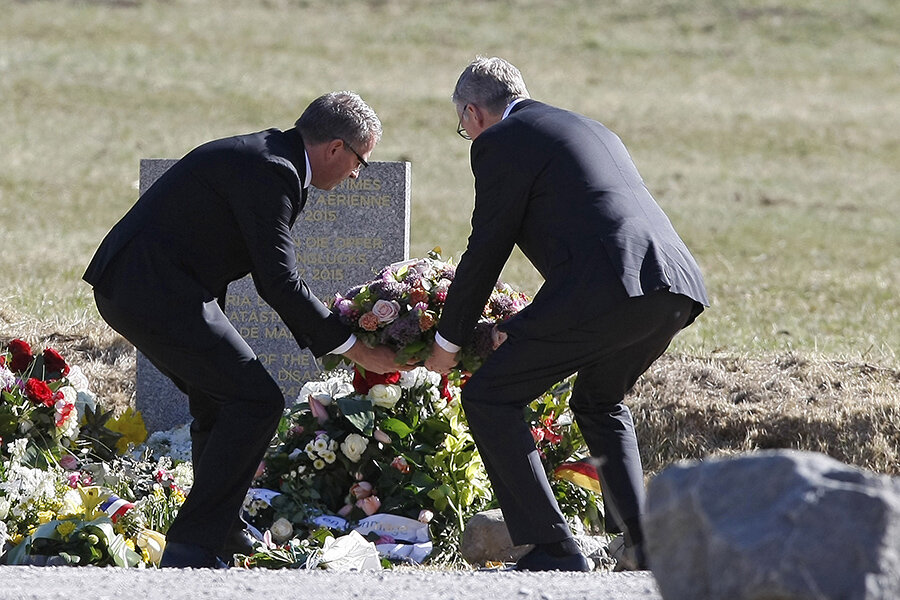Lufthansa CEO: It will take time to understand what led to plane crash
Loading...
| Seyne-Les-Alpes, France
Lufthansa's chief executive said Wednesday it will take "a long, long time" to understand what led to a deadly crash in the French Alps last week — but refused to say exactly what the airline knew about the mental health of the co-pilot suspected of deliberately destroying the plane.
Lufthansa CEO Carsten Spohr and the head of its low-cost airline Germanwings, Thomas Winkelmann, visited the crash area Wednesday amid mounting questions about how much the airlines knew about co-pilot Andreas Lubitz's psychological state and why they haven't released more information about it.
The two men laid flowers and then stood silently facing a stone monument to the plane's 150 victims that looks toward the French mountains where Germanwings Flight 9525 shattered into thousands of pieces on March 24. It bears a memorial message in German, Spanish, French and English.
Spohr said the airline is "learning more every day" about what might have led to the crash but "it will take a long, long time to understand how this could happen."
He then deflected questions from reporters at the site in Seyne-les-Alpes and drove away.
Based on audio from the plane's voice data recorder, investigators believe Lubitz intentionally crashed the plane and are trying to figure out why.
Lufthansa acknowledged Tuesday that it knew six years ago that Lubitz had suffered from an episode of "severe depression" before he finished his flight training at the German airline, but said he had passed all his medical checks since then.
The airline did not mention the severe depression episode when questions were raised last week about Lubitz's medical history.
German prosecutors say Lubitz's medical records from before he received his pilot's license referred to "suicidal tendencies," but visits to doctors since then showed no record of any suicidal tendencies or aggression against others.
The revelations intensify questions about how much Lufthansa and its insurers will pay in damages for the passengers who died — and about how thoroughly the aviation industry and government regulators screen pilots for psychological problems.
Germany's Transport Ministry said Wednesday there are already checks in place for employees in security-sensitive jobs, including pilots. However, spokeswoman Vera Moosmayer said someone who in the past suffered from severe depression could become a pilot if he or she passes the relevant medical.
"We will wait and collect the insights that coming out of this terrible tragedy, and then decide whether changes need to be made," Moosmayer told reporters in Berlin.
At the crash site Wednesday, authorities said investigators have finished collecting human remains. Lt. Luc Poussel said all that's left are "belongings and pieces of metal."
Officials at France's national criminal laboratory near Paris say it will take a few months for the painstaking identification process to be complete and for the remains to be returned to the families.
New images of the recovery operation released by the Interior Ministry showed investigators tugging out large, mangled pieces of the plane: tires, sections with several twisted windows and what looked like a piece of the orange-painted tail.
Questions persist about reports in the German daily Bild and the French magazine Paris Match about a video they say was taken by someone inside the cabin of the doomed plane shortly before it crashed. The publications say their reporters were shown the video, which they said was found on a memory chip that could have come from a cellphone.
Marseille Prosecutor Brice Robin, who is overseeing the French criminal investigation into the crash, told The Associated Press that investigators had found no such video. But in a statement Wednesday, he left open the possibility that such video had been found but not given to authorities.
"In the hypothesis that someone is in possession of such a video, he or she should submit it immediately to investigators," he said.
The Paris Match reporter who saw the video, Frederic Helbert, said on the magazine's website Wednesday that he was "offered the possibility to view it" after working with unnamed intermediaries linked to unnamed people at the search site.
Helbert said the video was shot from the back of the plane. He said no one is identifiable but it conveys "the human dimension of the panic" right before the crash.







